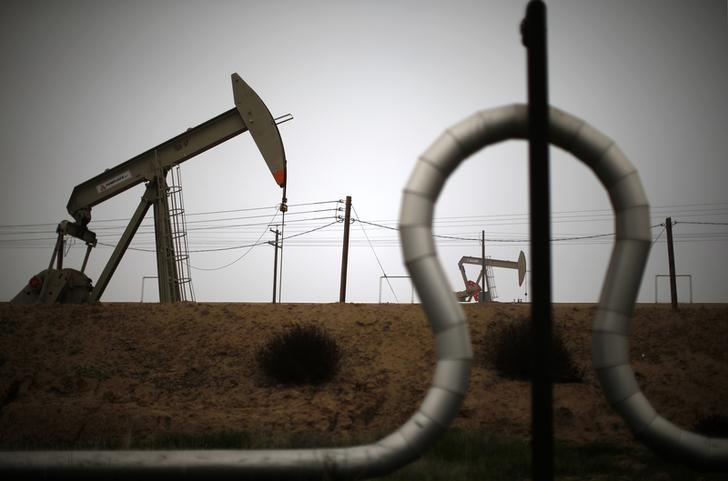By Robert Gibbons
NEW YORK (Reuters) - Oil prices turned higher on Wednesday in volatile trading as rallying equities on Wall Street pulled crude up from lows after futures sank on concerns about global oversupply.
U.S. stocks rose more than 1 percent in afternoon trading as technology stocks led a rebound from Tuesday's steep losses and as China's move to again support its financial markets eased investor concerns.
"Looks like risk-on trade with a rising tide lifting all boats," John Kilduff, partner at Again Capital LLC in New York, said.
Oil continued its recent turbulent trajectory on Wednesday after Tuesday's 8 percent slide ended a 25 percent three-session surge of frenzied short-covering after a drop 6-1/2-year lows early last week.
Brent October crude (LCOc1) was up 14 cents at $49.70 a barrel at 2:15 p.m. EDT (1815 GMT), having swung from $47.74 to
$50.79.
U.S. October crude (CLc1) was up 6 cents at $45.47, having traded from $43.21 to $46.32.
Crude sank earlier in the session after government data showed U.S. crude stockpiles rose 4.7 million barrels to 455.4 million barrels last week, the Energy Information Administration (EIA) said. [EIA/S]
"While there is some seasonality to crude beginning to build at this time of the year, a four-plus-million-barrel build is bearish and larger than normal," said Scott Shelton, commodities specialist with ICAP (LONDON:IAP) in Durham, North Carolina.
Analysts in a Reuters poll had expected U.S. crude stocks to have remained flat last week and the EIA report followed Tuesday's report from American Petroleum Institute (API) showing crude stocks rose 7.6 million barrels to 456.9 million.
Crude futures initially extended losses on news that Shell's
Also adding pressure was news that President Barack Obama has the backing of enough Senate votes to sustain a veto of any congressional resolution blocking Iran's agreement on its nuclear program with world powers.
Implementing the agreement will allow a sharp increase Iran's oil exports now curbed by sanctions.
Crude oil also received support from strong U.S. RBOB gasoline futures (RBc1) ahead of the U.S. Labor Day holiday and by news that a reformer unit at Philadelphia Energy Solutions'

EIA data showed gasoline inventories fell 271,000 barrels, less than the 1.3 million-barrel slide expected by analysts.